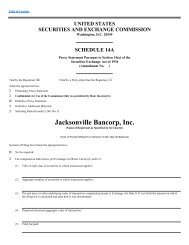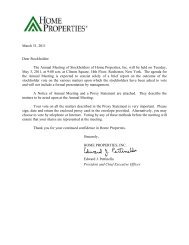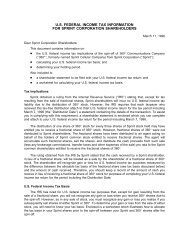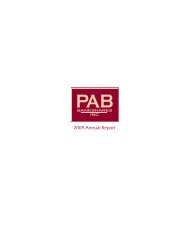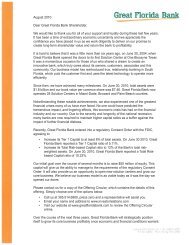Cousins Properties Incorporated 2006 Annual Report - SNL Financial
Cousins Properties Incorporated 2006 Annual Report - SNL Financial
Cousins Properties Incorporated 2006 Annual Report - SNL Financial
Create successful ePaper yourself
Turn your PDF publications into a flip-book with our unique Google optimized e-Paper software.
income, <strong>Cousins</strong> is subject to tax on the undistributed amounts at regular corporate rates. In addition, <strong>Cousins</strong> is<br />
subject to a 4% nondeductible excise tax to the extent that distributions paid by <strong>Cousins</strong> during the calendar year are<br />
less than the sum of the following:<br />
85% of its ordinary income;<br />
95% of its net capital gain income for that year, and<br />
100% of its undistributed taxable income (including any net capital gains) from prior years.<br />
We intend to make distributions to our stockholders to comply with the 90% distribution requirement, to avoid<br />
corporate-level tax on undistributed taxable income and to avoid the nondeductible excise tax. Differences in timing<br />
between taxable income and cash available for distribution could require <strong>Cousins</strong> to borrow funds to meet the 90%<br />
distribution requirement, to avoid corporate-level tax on undistributed taxable income and to avoid the nondeductible<br />
excise tax. Satisfying the distribution requirements may also make it more difficult to fund new<br />
development projects.<br />
Certain property transfers may be characterized as prohibited transactions, resulting in a tax on any gain<br />
attributable to the transaction.<br />
From time to time, we may transfer or otherwise dispose of some of our properties. Under the Code, any gain<br />
resulting from transfers or dispositions, from other than our taxable REIT subsidiary, deemed to be prohibited<br />
transactions would be subject to a 100% tax on any gain associated with the transaction. Prohibited transactions<br />
generally include sales of assets that constitute inventory or other property held for sale to customers in the ordinary<br />
course of business. Since we acquire properties primarily for investment purposes, we do not believe that our<br />
occasional transfers or disposals of property are deemed to be prohibited transactions. However, whether property is<br />
held for investment purposes is a question of fact that depends on all the facts and circumstances surrounding the<br />
particular transaction. The Internal Revenue Service may contend that certain transfers or disposals of properties by<br />
us are prohibited transactions. While we believe that the Internal Revenue Service would not prevail in any such<br />
dispute, if the Internal Revenue Service were to argue successfully that a transfer or disposition of property<br />
constituted a prohibited transaction, we would be required to pay a tax equal to 100% of any gain allocable to us<br />
from the prohibited transaction. In addition, income from a prohibited transaction might adversely affect our ability<br />
to satisfy the income tests for qualification as a REIT for federal income tax purposes.<br />
Disclosure Controls and Internal Control over <strong>Financial</strong> <strong>Report</strong>ing Risks<br />
Our business could be adversely impacted if we have deficiencies in our disclosure controls and<br />
procedures or internal control over financial reporting.<br />
The design and effectiveness of our disclosure controls and procedures and internal control over financial<br />
reporting may not prevent all errors, misstatements or misrepresentations. While management will continue to<br />
review the effectiveness of our disclosure controls and procedures and internal control over financial reporting,<br />
there can be no guarantee that our internal control over financial reporting will be effective in accomplishing all<br />
control objectives at all times. Deficiencies, including any material weakness, in our internal control over financial<br />
reporting which may occur in the future could result in misstatements of our results of operations, restatements of<br />
our financial statements, a decline in our stock price, or otherwise materially adversely affect our business,<br />
reputation, results of operations, financial condition or liquidity.<br />
Item 1B. Unresolved Staff Comments<br />
Not applicable.<br />
14





